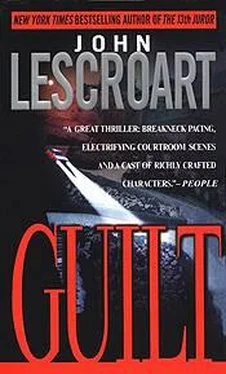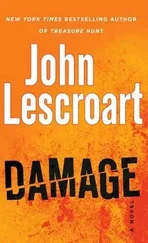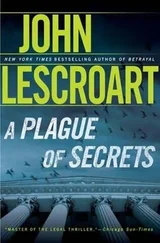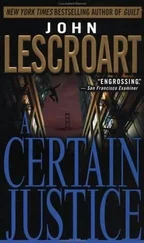John Lescroart - Guilt
Здесь есть возможность читать онлайн «John Lescroart - Guilt» весь текст электронной книги совершенно бесплатно (целиком полную версию без сокращений). В некоторых случаях можно слушать аудио, скачать через торрент в формате fb2 и присутствует краткое содержание. Жанр: Триллер, на английском языке. Описание произведения, (предисловие) а так же отзывы посетителей доступны на портале библиотеки ЛибКат.
- Название:Guilt
- Автор:
- Жанр:
- Год:неизвестен
- ISBN:нет данных
- Рейтинг книги:3 / 5. Голосов: 1
-
Избранное:Добавить в избранное
- Отзывы:
-
Ваша оценка:
- 60
- 1
- 2
- 3
- 4
- 5
Guilt: краткое содержание, описание и аннотация
Предлагаем к чтению аннотацию, описание, краткое содержание или предисловие (зависит от того, что написал сам автор книги «Guilt»). Если вы не нашли необходимую информацию о книге — напишите в комментариях, мы постараемся отыскать её.
Guilt — читать онлайн бесплатно полную книгу (весь текст) целиком
Ниже представлен текст книги, разбитый по страницам. Система сохранения места последней прочитанной страницы, позволяет с удобством читать онлайн бесплатно книгу «Guilt», без необходимости каждый раз заново искать на чём Вы остановились. Поставьте закладку, и сможете в любой момент перейти на страницу, на которой закончили чтение.
Интервал:
Закладка:
He put his hand up to his forehead, combed his hair back with his fingers. 'And after that, what's she going to do anyway? Leave?'
'She might. It might save her life.'
'She could leave now. Save her own life. It's not my job. No part of it is my job. Shit.'
Sam came toward him – she always did this because it so often worked – and put her arms around him. 'I think she wants to know what you know, Wes, that's all. She's carrying his baby. That's a hell of a commitment. She can't just walk out. She's got to be absolutely sure.'
'She'll never be sure, Sam. She knows everything I know already. It's all in her head, damn it.' But his arms came up around her, his head down to the hollow of her neck.
'When?' he asked.
'I told her tomorrow morning,' she said, smiling sweetly up at him, going up on her tiptoes to plant a kiss. 'Would that be a good time?'
Glitsky had moved in his deliberative way back to the land of the living.
Nat, at seventy-eight, started studying to become a rabbi. He was doing aerobic walking from Arguello to the beach every single day and was never going to die, wasn't even going to age any further, and for this Abe was grateful.
Glitsky's oldest son Isaac was graduating from high school in a couple of weeks, and he'd turned into a reasonable approximation of a young adult. On the day after graduation, he was leaving on a bicycle tour of the West Coast with three friends. He planned to be gone for most of the summer and had been accepted at UCLA in the fall.
Jacob – his hip seventeen-year-old – had gone on what Glitsky thought had been a mercy field trip to the Opera with his godmother, one of Flo's old college roommates. Over the howling derision of his brothers and his own misgivings, Jacob had spent an evening in San Francisco's Grand Hall. Then another. The experience – the grandeur, drama, emotion, tragedy – had transformed him. Before too long he was going down for Sunday matinees, standing in the back, buying discount tickets with his own money.
He'd started buying CDs. First the old duplex had been filled with the strains of the Three Tenors doing songs. But in short order he'd branched out into arias, then whole passages. He would study the scores, the librettos. He began taking Italian, of all things, as a special elective in school. Discovering that he had a rich baritone of his own, Jacob found an instructor who said it could be developed.
And the youngest boy changed his name. Living in the house of a half-black cop, the nickname O.J. had to go, so now he was Orel James, his given name. The boy looked more and more like his mother, Flo, each day.
Orel was still having a difficult time. At school, he remained withdrawn. He did a lot of headphones time, his Walkman. SEGA Genesis ruled the rest of his waking hours. And he'd developed a stutter.
His older brothers didn't play with Orel like they used to. Abe knew, heart-rending as it was, that this was how it should be – everybody was growing up. The older boys had their lives. Orel wasn't their responsibility anyway.
It fell to Glitsky, no one else. He accepted it, and sometimes thought that somebody else needing him was what saved him, what pulled him through it finally.
He had to start coming home, to help Orel with homework, to go to parent conferences about his boy, to be free on weekends. Abe had played college football – tight end at San Jose State – and Pop Warner needed coaches.
Suddenly he found himself out among humanity. Fathers, women, non-cops, other children. This was disorienting at first, but then he and Orel would go out for a shake afterwards and they'd have some things in common to talk about. Football, then – startlingly for both of them – what they were feeling.
He started making it a point whenever he could to be home in time to tuck Orel in at night, to sit and see Flo's face in his son's and realize part of her was still there, and listen to the stutter lessen as sleep closed in.
And then, gradually, starting to hear the boy himself, his own voice and identity, what he was saying – his secrets and worries and hopes – and sometimes he didn't know what this feeling was for his baby, it was so strong. Where before, he had barely known Orel.
Wondering – marveling – at the seeds that could spring up after the forest had been felled and cleared, he'd sit there, Orel sleeping with his breath coming deep, and he'd rest his hand on the boy's chest in the dark. Empty.
Filling up.
Now he was washing the dinner dishes, looking out his open back window into the Presidio National Park. A glorious evening, the sky above dark blue, almost purple. The day's remaining light had a peculiar reddish glow. Fog over the ocean.
The older boys, out doing important end-of-school teenage things, hadn't made it home for dinner. He heard Orel doing his spelling words with Rita, the letters coming out clearly, one by one. No stutter.
The telephone rang and he dried his hands, picking it up on the third ring, another change for the better. It used to be on one, always.
At home now, when the phone rang, it wasn't always for him. Girls would call for the boys. Also other guys. For years, Glitsky's greeting had been to growl his name. Now he picked up the receiver and said hello, just like a regular citizen.
'Abe?'
'Yeah.'
'This is kind of a strange call. A voice, as it were, from the strange and distant past. Mostly strange.'
Glitsky, standing at his kitchen wall phone on this Thursday night, couldn't place it. He knew it, but not well. Whoever it was had his home phone number, so though mostly strange, it couldn't be too distant. Then the tumblers fell. 'Wes?'
'Very good, Lieutenant. I'd even say excellent. How've you been this fine past year?'
'I've been good, Wes. What can I do for you?'
Farrell spent a couple of minutes running down some background on his meeting tomorrow with Christina Carrera. Glitsky listened without interrupting.
Glitsky had survived the political fallout from the Dooher trial, and over the past year and a half had distinguished himself in his job to the point where he felt relatively secure in it.
But Dooher was unfinished business. Any mention of him got all of Abe's attention right now.
Farrell concluded, 'If she's getting ready to walk away from him, I'd like to give her a hand. It looks to me she's gotten to where she knows what he's done, but she still can't face it. She's going to want something more.'
Glitsky was sitting on a chair at the kitchen table. 'So what do you need from me?'
'I don't know. I thought you might have come across some evidence since the trial.'
Glitsky was not unaware of the irony. The defense lawyer who'd convinced a jury that his client was Not Guilty was now asking if they'd turned up any new evidence to convince a colleague that he'd been guilty after all. 'I gave everything to Amanda Jenkins, Wes. When Dooher got off, the investigation ended.'
There was a pause. 'How about Trang? That case is still open, isn't it, technically?'
Glitsky admitted that it was, although by now it was what they called a skull case – long gone and all but forgotten. 'Trang hasn't been taking up a lot of my time, Wes. We got called off on that one, you may remember.'
Farrell felt as though he deserved the rebuke, but he persisted. 'What I'm trying to do,' he said, 'is give her a taste of what you've got, what you had.'
'And then what?'
'I don't know. It might save her life.'
'He threatening her?'
'I don't know. But I don't know if he threatened Sheila either. Or Trang. Threats don't seem to come with the package.'
Glitsky knew what Farrell was saying. This man plotted and struck. He wasn't going to telegraph any moves. 'So what do you want?' he repeated.
Читать дальшеИнтервал:
Закладка:
Похожие книги на «Guilt»
Представляем Вашему вниманию похожие книги на «Guilt» списком для выбора. Мы отобрали схожую по названию и смыслу литературу в надежде предоставить читателям больше вариантов отыскать новые, интересные, ещё непрочитанные произведения.
Обсуждение, отзывы о книге «Guilt» и просто собственные мнения читателей. Оставьте ваши комментарии, напишите, что Вы думаете о произведении, его смысле или главных героях. Укажите что конкретно понравилось, а что нет, и почему Вы так считаете.












